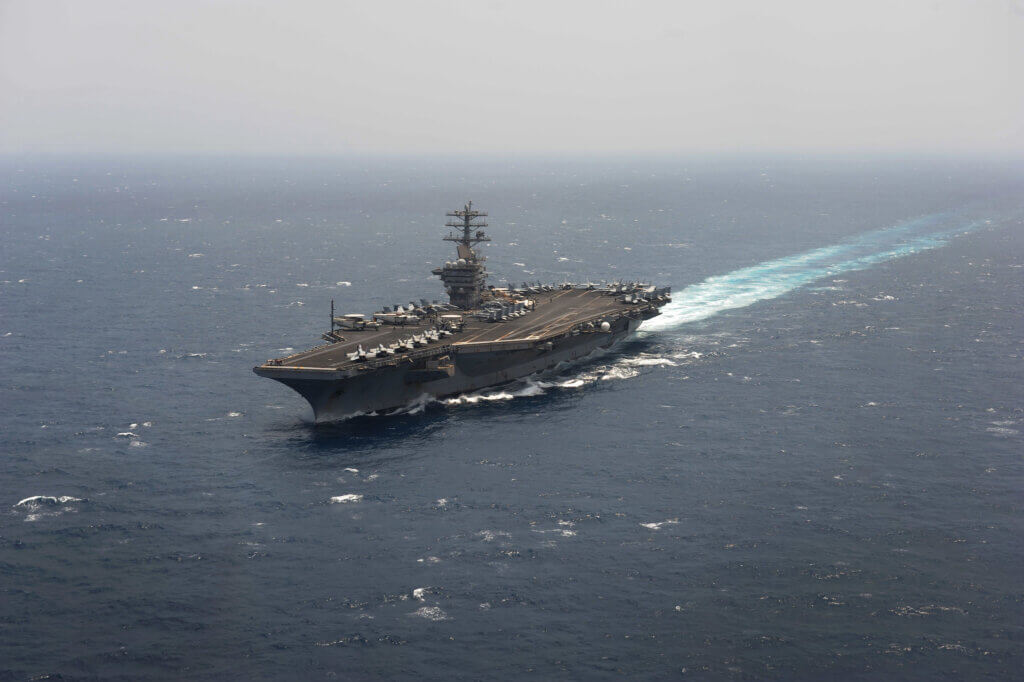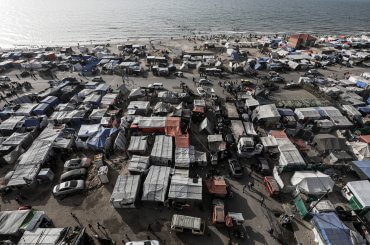Israel’s war on the people of Gaza is gradually seeping out of Israel and Palestine and into the wider region as groups take action in support of the Palestinians. At first, the focus was on Israel’s northern border with Lebanon, where exchanges between Israel and Hezbollah have, indeed, been slowly escalating. But in recent weeks, focus has shifted to Yemen, where the Ansar Allah party (commonly referred to as “the Houthis”) and its associated militia, which controls the majority of the country, has also taken military action in support of the Palestinians.
Initially, Ansar Allah was launching a few missiles and drones in the direction of Israel. These were easily intercepted by American and Saudi naval forces. More recently, they have been harassing and targeting commercial ships. Ansar Allah says they are targeting ships that have some connection to Israel, either because they are delivering Israeli cargo, delivering goods to Israel, or owned by Israelis. But they have, intentionally or otherwise, also attacked ships that had no clear connection to Israel. They also took hostages from a ship that was partially Israeli-owned in November.
In response to Ansar Allah’s attacks, the United States has assembled what it terms an international force, although the overwhelming majority of the power and number of ships is American, at least for the moment. In announcing the new maritime force, U.S. Secretary of Defense Lloyd Austin stated, “The recent escalation in reckless Houthi attacks originating from Yemen threatens the free flow of commerce, endangers innocent mariners, and violates international law.”
It is true, of course, that Ansar Allah’s attacks on commercial ships violate international law. They have also illegally detained some of the crew on at least one ship, which is also illegal. But when you have facilitated the murder of over 20,000 Palestinians, the vast majority of them women and children; funded and protected attacks on mosques, churches, United Nations facilities, schools, and even hospitals; participated in the intentional deprivation of food, water, medical supplies, and shelter from civilians; and intentionally facilitated these monumental crimes against humanity that amount to a strong case for genocide, to then accuse another party of violating international law is the sort of hubristic hypocrisy that only the United States is capable of, a point Ansar Allah leader Muhammad Al-Houthi made himself
Operation Prosperity Guardian
The United States tried to recruit Arab countries to the coalition but managed almost nothing. Bahrain is the only Arab state participating, and they have no military. Bahrain houses the U.S. Fifth Fleet, so its participation is, to an extent, automatic. Otherwise, even states like Saudi Arabia, Egypt, and the UAE declined to participate, although the Bahraini involvement means the Saudis can keep a hand in the game.
The U.K., France, and Italy will send a handful of ships, while other countries have agreed to either send a few naval officers or have not yet specified what their participation will entail. Those countries include Canada, the Netherlands, Norway, the Seychelles and Spain. For most of them, participation is a token, indicating that they support protecting shipping in the Red Sea but that they are going to allow the United States to be the bully in the room.
The actual mission of the fleet is less clear. Most likely, the U.S. is hoping that the mere presence of this multinational force will deter Ansar Allah’s activities, but this seems very unlikely to succeed. Certainly, we can expect defensive measures, such as intercepting Yemeni boats and shooting down drones and missiles.
But if Ansar Allah persists, as they are likely to, those measures will not make the waters safe enough for major shipping companies to continue their operations. Already, at least a dozen have curtailed their operations in the Red Sea, including such shipping giants as Maersk and HMM. So, if the increased Western naval presence does not deter Ansar Allah, the next step would be an attack on the mainland of Yemen.
While American and Israeli propaganda tends to ascribe the actions of Ansar Allah, like Hezbollah and Hamas, to nefarious Iranian machinations, these are all independent actors supported and influenced, but not controlled, by Iran. The Islamic Republic has made clear its desire to stay out of the fighting, fearing a regional war, but if shooting escalates, it is always possible that more parties can be drawn in.
Economic impact
Despite some of the more hysterical headlines and pronouncements, the threat to Red Sea shipping is likely to have a detrimental, but not cataclysmic, effect on the global economy. While some 12% of global trade involves shipping along the Red Sea, there are alternatives. In fact, some shipping companies have already begun diverting their ships’ routes southward around the Cape of Good Hope at the southernmost tip of Africa and then back northward toward Europe or Western Africa.
In the short term, there will be an increase in many prices as a result, especially while the supply chain adjusts to the increased shipping time, causing some temporary shortages of goods. However, there are two countries that will feel more acute effects, and this is surely part of Ansar Allah’s strategy. Those two countries are Egypt and Israel.
Egypt’s potential loss is significant. The Egyptian economy is already teetering on the verge of collapse. As ships divert their route away from the Red Sea, they will not be passing through the Suez Canal. That could mean a significant loss of revenue for Egypt if more shipping companies either suspend their Red Sea shipping or divert around the Cape of Good Hope.
It’s a mark of American blindness that even under such circumstances, where Egypt has such an immediate and pressing interest in stopping the Ansar Allah interference with shipping, it still would not join the American operation. The United States simply does not see the extent to which it is alienating and infuriating the entire Arab world with its support of Israel’s genocide in Gaza. Even a totalitarian like Egyptian President Abdel Fattah El Sisi cannot go against this overwhelming sentiment and maintain both his grip on power and status in the Arab political world.
While the economic damage to Egypt is likely incidental for Ansar Allah, the potential damage to Israel is strategic and intentional, even while it is largely being ignored by Western media. Israel is forced to deal with all the same increased costs as any other country but it must also face the fact that some companies, like the large Taiwanese shipping company, Evergreen Line, are no longer willing to chance carrying Israeli cargo.
Israel is heavily dependent on maritime trade, so this has the potential to hit hard as costs grow. Many ships are now charging an extra surcharge for goods bound for Israel. Insurance costs are rising for any shipping that comes from or goes to Israel, as well as for any companies owned in part or whole by Israelis, as they can be potential targets.
The Israeli government has said it would pay for damage to ships from Ansar Allah attacks, but it has not yet offered to cover other costs like surcharges and insurance. And this is only the beginning. These costs can rise much more, especially if the Red Sea becomes a combat zone and if Israeli shipping is challenged elsewhere.
The next steps
With the greatest costs borne by the two biggest beneficiaries of United States military aid in the region, the U.S. is not likely to be a passive actor. Yet, as fighting intensifies between Israel and Hezbollah, and with a looming confrontation in the Red Sea, the U.S. is flirting dangerously with the regional conflagration it has been trying to avoid since October 7.
Ansar Allah is not stupid. They rose from a small group in Yemen to now being effective rulers and are even now negotiating with Saudi Arabia on a permanent settlement of the conflict that will leave them in charge. They have essentially won that war despite going up against Saudi Arabia and the United States.
The current action is partly motivated by their bargaining with the Saudis. Saudi Arabia wants to end the fighting with Yemen and move toward a more stable relationship with its new rulers, just as it has been pursuing a more stable and less confrontational tone with its adversary, Iran.
The Ansar Allah attacks on commercial shipping complicate that but also cast some shame on Saudi Arabia and other Arab states for sitting by passively while Israel wipes out the people of Gaza. That support for Palestine and their willingness to confront the Americans will significantly elevate Ansar Allah’s standing in the Arab world, and this is a big part of their motivation. It will strengthen their position in talks with the Saudis (if they don’t overplay their hand) and is also a factor in why the Saudis are staying out of the American coalition.
Ansar Allah has already withstood a significant bombardment by the Americans, sustained over the years. They have every reason to believe they can do so again. The Biden administration seems to have no idea just how much rage there is in every Arab state over Israel’s actions and the U.S. support for them. They seem to think the only reactions that matter are those of the dictators and diplomats they meet with. But those dictators and diplomats know better, and so does Ansar Allah.
Ansar Allah is establishing itself as a force to be reckoned with once they reach an agreement with the Saudis, something which is still likely to happen despite the current problems. The Biden administration is responding exactly as Ansar Allah expects them to. The sheer mindlessness of the response, doing just what your adversary anticipates and plans on you doing, is a searing indictment of the lack of strategic thinking that has characterized the American response to everything that has happened since October 7.



“The Biden administration seems to have no idea just how much rage there is in every Arab state over Israel’s actions and the U.S. support for them. They seem to think the only reactions that matter are those of the dictators and diplomats they meet with.”
Precisely. And that’s why, for all that we may mock him, that pompous ass Friedman in the NYT is actually dangerous.
“It’s a mark of American blindness that even under such circumstances, where Egypt has such an immediate and pressing interest in stopping the Ansar Allah interference with shipping, it still would not join the American operation. The United States simply does not see the extent to which it is alienating and infuriating the entire Arab world with its support of Israel’s genocide in Gaza. Even a totalitarian like Egyptian President Abdel Fattah El Sisi cannot go against this overwhelming sentiment and maintain both his grip on power and status in the Arab political world.”
The American Century is coming to an end.